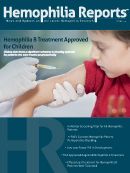Inhibitor Development Risk in Patients with Hemophilia Higher than Previously Thought
For mild hemophilia A patients, the risk of inhibitor development is higher than previously thought, according to findings published in the journal Blood.

Inhibitor development in patients with mild hemophilia A is a larger risk than previously anticipated, though desmopressin may help, according to a literature review published in the journal Blood.
Researchers from the Hemophilia and Thrombosis Center at the San Bortolo Hospital in Vicenza, Italy, reviewed the current literature surrounding mild hemophilia A (MHA) patients, which they defined as factor VIII or factor IX (FVIII and FIX, respectively) between 5 and 40 U/dL.
The current literature agrees MHA patients are not very likely to develop inhibitory antibodies after treatment with FVIII concentrate. But after exposure days (ED) are taken into account, the researchers found, the development of inhibitors increases with the number of ED to FVIII concentrates. One study showed the inhibitor risk in patients with non severe hemophilia A patients, including MHA patients, was 6.7 percent at 50 ED and rose to 13.3 percent after 100 ED. The researchers noted this may indicate inhibitor development throughout a MHA patient’s lifetime. This is contrasting evidence to severe hemophilia A patients, whose highest risk for inhibitor development occurs at 10-15 ED, and is almost negligible after 50 ED.
The researchers also reviewed predictors of MHA, which are nearly always FVIII missnse mutations. However, about 5-10 percent of patients may have splicing defects, point deletions, deep intronic changes, or promoter mutations. There is no clear reason for these mutations to carry an increased risk for inhibitors, the researchers wrote. Studies have shown p. Arg612Cys was a strong risk factor along with intensive perioperative FVIII administration and that inhibitor presence in MHA is suggested by a sudden change in a patient’s bleeding patterns.
The investigators determined most patients are at risk for severe bleeding complications even when inhibitor disappearance spontaneously occurs after cessation of FVIII treatment. Treatment with FVIII bypassing agents can typically suppress bleeding patients in patients with inhibitors, such as recombinant FVIIa (Novoseven, 90 μg/kg intravenously every 2-3 hours), activated prothrombin complex (FEIBA, 50 U/kg every 8-12 hours), or desmopressin. The current literature is generally anecdotal and heterogeneous and the researchers were unable to draw definite conclusions recommending the best regimens. For example, immunomodulatory drugs, avoidance reexposure to exogenous FVIII, desmopressin, and bypassing agents have all been used to some success in the data.
Desmopressin was the researchers’ top choice for reducing the risk for inhibitor development in MHA patients, after reviewing the studies. The researchers acknowledge that desmopressin — generally administered intravenously at 0.3 μg/kg body weight diluted in 50-100 mL saline for 20-30 minutes – is cheap, safe, and carries no risk for blood borne virus transmission. There has yet to be a clinical trial proving its efficacy, though. There is a particular risk in small children who have received closely repeated desmopressin infusions for hyponatremia and volume overload from the antidiuretic effect of the drug.
“The identification of several high-risk mutations emphasizes the need to adopt preventive measures in patients carrying these mutations,” the researchers wrote. “The use of desmopressin is an important clinical strategy to reduce exposure to therapeutic FVIII concentrates, thereby mitigating inhibitor risk, as well as for patients who do not carry high-risk mutations. Avoidance of intensive courses of treatment with FVIII concentrates should be considered, especially in those patients known to carry a high-risk mutation or with a relative who developed an inhibitor.”
